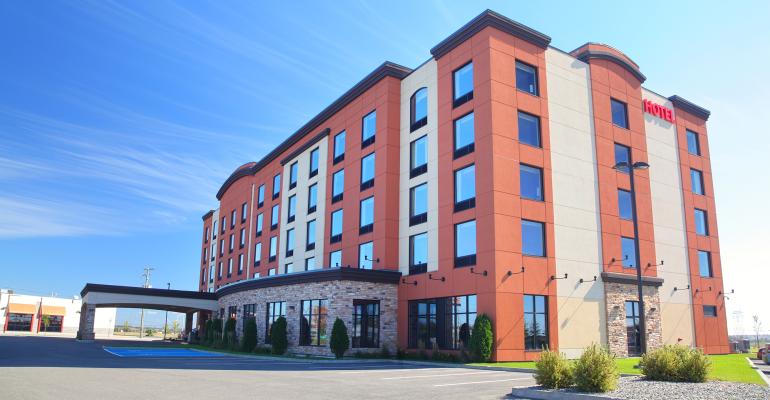Although the wave of distressed buying that some envisioned never materialized, investors may still have a chance to put money into hotel properties stressed by the coronavirus pandemic given rising interest rates and the possibility of a recession in the near future.
“During COVID we effectively kicked the can down the road,” says Brian Waldman, chief investment officer for the Peachtree Group, based in Atlanta. “Now we are seeing more pressure. Now it is time to face the music.”
Higher interest rates and deferred capital expenditures may finally push some owners to look for new equity partners or even sell their properties. It’s not likely to be the kind of fire sale investors had expected, with deep discounts compared to prices before the pandemic.
“Now we are seeing stressed owners rather than distressed assets,” says Waldman.
Less distress than anyone thought
It must be frustrating for hotel investors who were looking for opportunistic plays. When the coronavirus pandemic struck, and most of the U.S. economy suddenly shut down, it seemed obvious many hotel properties would fail. Hotels forced to shut their doors had no income from hotel guests–but they still had mortgage payments.
Funds raised equity and stood ready to buy assets seized by lenders and offered for sale at a discount. But it just didn't play out that way.
“There has been far less distress than people initially anticipated,” says Kevin Davis CEO of JLL Hotels & Hospitality, Americas, based in New York City.
Many hotel owners held on. A few sales of distressed portfolios made headlines. But most owners were unwilling to sell at the deep discounts buyers were looking for. “There has been a big ‘bid-ask’ spread,” says Waldman.
Investors spent $165.3 million to buy distressed hotel properties in third quarter of 2020, or 7.1 percent of the total $2.3 billion spent to buy hotels in that quarter, according to data from MSCI Real Assets. That’s more than twice the $69.5 million investors spent to buy distressed hotels in the first quarter of 2020, or 1.4 percent of the $5.1 billion total.
So far, the most investors have spent to buy distressed hotels was $1.2 billion in the third quarter of 2021, or 11.8 percent of the total $10.2 billion spent to buy hotels in that quarter, according to MSCI. By second quarter of 2022, investor spent just $296.2 million to buy distressed hotel properties, or 2.8 percent of the total $10.7 billion spent to buy hotels.
The federal government provided a lot of help to hotel properties. The Federal Reserve immediately cut its benchmark interest rates done to zero and began massive purchases of bonds to support the capital markets and keep interest rates low.
“The Fed encouraged lenders to work with borrowers,” says Davis.
The Congress also passed billions of dollars in stimulus to support the economy.
In addition, hotels have recovered more quickly than expected–especially hotels that serve leisure travelers.
A few giant portfolios sold in 2021
Institutional investors spent hundreds of millions apiece to buy several large portfolios of distressed hotels in 2021, totaling more than $1 billion in sales. In August 2020 KKR purchased a portfolio of 48 hotels owned by Digital Bridge, the real estate investment trust formerly known as Colony Capital, which had reportedly defaulted on CMBS loans on the properties. Also, in June 2021, Monarch Alternative Capital paid $360 million for ten full-service hotels in four states from bankrupt Eagle Hospitality Real Estate Investment Trust.
“The distress was highly situational, not systemic,” says JLL’s Davis.
No big portfolios of distressed hotels have traded so far in the first half of 2022, according to MSCI. Institutional investors are no longer the dominant buyers—instead they have been responsible for 21 percent of the dollars spent on distressed hotels this year so far—less than half their share of the deals in 2021.
“In 2022, there have been no portfolio sales and thus it is no surprise that institutional investment has fallen off,” says Alexis Maltin, vice president of real estate research for MSCI.
The next round of distress—or at least stressed—hotel sales
Many hotels may soon face problems that will either force them to sell their properties or at least raise more equity.
“It could be a significant opportunity to invest,” says Davis.
Financing is biggest challenge. Many hotels have five-year or seven-year, floating-rate loans that are reaching the end of their terms and need to be refinanced. “Leverage is coming down and interest rates are coming up,” says Peachtree’s Waldman.
The index for floating rate loans, the Secured Overnight Financing Rate (SOFR), has already risen more than 200 basis points since the start of 2022—borrowers are already paying that cost on their old, floating-rate loans.
The all-in interest rate for a new loan is likely to be even higher. Many leading banks have stepped back from commercial real estate lending in recent months. “Banks have certain allocations to lend to commercial real estate. Once they fill their allocations, they are done for the year,” says Waldman.
The remaining lenders are adding more to the interest rates that charge borrowers. “The borrowing cost for a new loan may be 500 basis points higher,” says JLL’s Davis. “If you are refinancing today, the all-in interest rate might very well be 8.5 percent.”
The higher interest rate will cut deeply into the size of a loan that a hotel will be able to support—even if the hotel is performing relatively well.
Hotels also often need a considerable amount capital expenditures. “Most owners did not invest in cap ex during COVID,” says Davis. Now hotel brands that had allowed owner to spend less on capital expenditures or even brand standards—like the breakfast spread.
“That is going to trigger opportunities for investors to provide rescue equity and or preferred equity,” says Davis.





